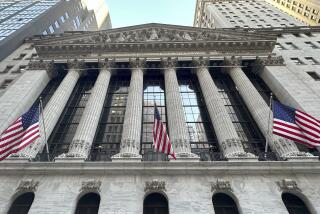Conflicting concerns for older investors: Safety, inflation, growth
For now, many aging baby boomers still are in the wealth-accumulation phase of life.
Here’s how some Wall Street pros see boomers focusing their portfolios in the next few years:
Safety first: Millions of investors have favored high-quality bonds over stocks since the 2008 market crash, seeking income and security.
Robert Arnott, head of money manager Research Affiliates in Newport Beach, thinks that trend won’t fizzle soon — even if stocks keep rebounding.
“We’re at the sweet spot for bonds now,” he said.
Low bond yields may mean negative returns for investors after inflation and taxes, but the desire for relative safety will keep money flowing to fixed-income assets, Arnott said.
A big risk: A jump in yields could devalue older bonds. But the Federal Reserve expects to keep short-term rates near zero until 2015, in large part to keep a lid on longer-term rates.
Inflation protection: Jason Trennert, chief investment strategist at Strategas Research Partners in New York, thinks the torrent of money that major central banks have pumped into the financial system since 2008 will come back to haunt markets. “Eventually we’re going to have an inflation problem,” he said.
Arnott agrees. “I see this year as the time to build an anti-inflation portfolio,” he said. He’s doing that in his Pimco All Asset mutual fund, using investments such as emerging-market bonds, commodities and high-yield corporate bonds.
Trennert believes that blue-chip stocks paying rising dividends will continue to gain respect among boomer investors. If inflation rises, “equities may be the only shot at getting a real return on your money,” he said.
Emerging-market growth: U.S. investors have continued to pour money into emerging-market stock mutual funds, even as domestic stock funds have suffered net redemptions.
Markets in China, Brazil, Russia and other developing economies are notoriously volatile. But in the long run, those economies remain the world’s best hope for above-average growth, Arnott said.
Investing in emerging-market stocks is making two growth bets: first, that companies in those economies will do well; and second, that the populations of those countries will become wealthier and will invest more in their own stocks.
Though foreign investors, like Americans, often invest outside their own borders, people naturally tend to favor their local markets. “There is definitely a ‘home-market bias,’” said Russ Kinnel, head of mutual fund research atMorningstar Inc.in Chicago.
More to Read
Inside the business of entertainment
The Wide Shot brings you news, analysis and insights on everything from streaming wars to production — and what it all means for the future.
You may occasionally receive promotional content from the Los Angeles Times.










